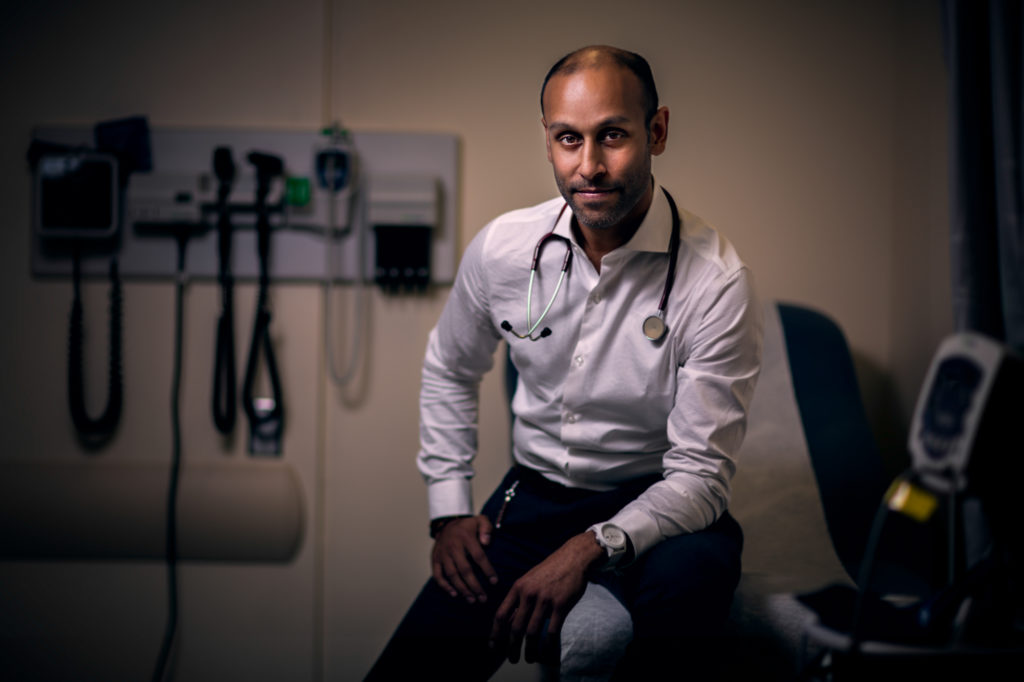
Creating an alternative treatment option
By: Dr. Nikhil Pai
Pediatric gastroenterologist, McMaster Children’s Hospital
Assistant professor, department of pediatrics, McMaster University
Coughs and colds, stomach aches, and fevers are part of every child’s life. But being diagnosed with a chronic disease is a reality for some children and their families, and presents a scary, and very uncertain new way of life. As a doctor and researcher, I’ve focused my career on exploring how to make life easier for some of these kids who struggle with lifelong diseases.
I take care of a lot of children with inflammatory bowel disease (IBD), a chronic autoimmune condition that affects the intestinal tract. When parents are told their child has this diagnosis, they react with shock, disappointment, and feeling totally overwhelmed. We’ve come a long way over the past few decades at being able to get IBD under control, but keeping it that way involves life-long medications. For many parents, that realization is almost more overwhelming than the diagnosis itself. Daily medications that have tough side effects are not what parents look forward to for their kids. Families ask about other options. Up until recently, “other options” have always involved different kinds of medications – a repetitive path that can be discouraging.
The trial was ambitious, and it worked.
When I was doing my pediatric gastroenterology training, I began research on the role of bacteria in the intestinal tract and how this can affect our overall health. Studies showed that kids with IBD had different types of bacteria than kids who were healthy, and my research gradually focused upon whether diseases could be treated by changing that bacteria itself. When I came to Hamilton Health Sciences in 2014, several colleagues in McMaster’s Department of Adult Gastroenterology had launched a groundbreaking study on the role of transplanting healthy, intestinal bacteria into adults with inflammatory bowel disease. The trial was ambitious, and it worked. Many of these patients got significantly better after this intervention. This type of treatment had never been explored through a carefully designed, formal research study in kids. With parents continuing to ask about other options, we decided to launch a trial that could give these families another option.
In 2015, with the assistance of extremely supportive senior mentors from Hamilton Health Sciences and our research coordinator, Jelena Popov, Hamilton Health Sciences’ Division of Pediatric Gastroenterology became the very first center in the world to offer families participation in a randomized controlled trial of fecal transplant for pediatrics. After extensive planning and approvals – as is required for all clinical research to ensure safety and ethical care – we successfully enrolled our very first participant in the winter of 2015. This patient was a young child with IBD who had already failed numerous high dose medications, was considering potential surgery if her condition worsened, and whose family was given one more option: even stronger medications. Our trial offered her something else, instead.
Research trials like PediFETCh don’t offer families a guarantee, but they do offer options.
Since then, we’ve enrolled numerous other patients, have gained two partner sites in London Health Sciences Center and Montreal Children’s Hospital, and are expanding our trial to include another set of chronic inflammatory bowel disease patients later this year.
Our trial is ongoing – we aren’t even close to analyzing results yet – and a few other centers across the U.S. and Europe have started running their own studies for kids. Research trials like PediFETCh don’t offer families a guarantee. But, experimental therapies like fecal microbial transplant do offer families options. When a child gets a diagnosis like IBD, overnight a parent can go from being responsible for every part of their kid’s life to feeling like a bystander. Hospital admissions, invasive tests, confusing terminology, and medications delivered in unmarked IV bags and plastic cups take a toll. Having choices puts families back in charge.
We hope our research will show that fecal transplant is a choice that works. We don’t have all the answers yet, but we’re determined to try and find better ways to help kids and their families living with IBD get the very most out of life.
